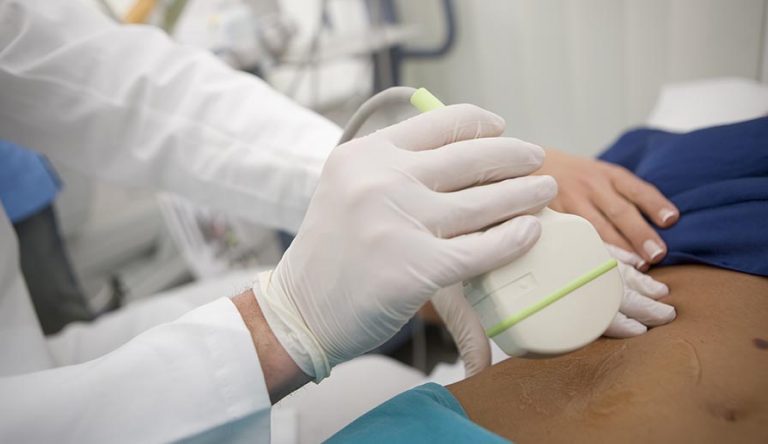Ultrasound is a safe, painless, and non-invasive imaging technique that uses high-frequency sound waves to create real-time images of the inside of the body.
Unlike X-rays or CT scans, ultrasound does not use radiation, making it suitable for everyone — including pregnant women and children.
At International Ultrasound Services in London, we provide private ultrasound scans for the diagnosis and ongoing monitoring of a wide variety of medical conditions. All scans are performed by experienced consultant sonographers and radiologists, ensuring high-quality imaging and accurate reports.
How Ultrasound Works
Ultrasound works by sending sound waves into the body using a small handheld device called a transducer. These waves bounce back when they encounter different tissues and organs, producing a detailed, real-time image on the screen.
There are different types of ultrasound scans:
2D ultrasound – standard black-and-white imaging for internal organs.
3D ultrasound – creates three-dimensional images for more detailed assessment.
Doppler ultrasound – evaluates blood flow in arteries and veins, helping detect blockages or narrowing.
Because ultrasound provides instant feedback, it’s ideal for both diagnosis and ongoing monitoring of many health conditions.
Common Health Conditions Detected by Ultrasound
A. Abdominal Conditions
Abdominal ultrasound is one of the most common types of scans and can help identify problems in several organs, including:
Liver: fatty liver, cysts, cirrhosis, or liver tumours.
Gallbladder: gallstones or inflammation (cholecystitis).
Kidneys: stones, cysts, obstructions, and tumours.
Pancreas: inflammation (pancreatitis) or pancreatic masses.
Aorta: abdominal aortic aneurysm (AAA) screening.
👉 Learn more: Private Abdominal Ultrasound Scan in London
B. Pelvic and Gynaecological Conditions
Pelvic ultrasound is used to examine the uterus, ovaries, and bladder, helping diagnose:
Uterine fibroids and endometrial thickening or polyps.
Ovarian cysts, polycystic ovary syndrome (PCOS), or tumours.
Pregnancy-related issues, such as early pregnancy assessment, fetal growth, or placental position.
Bladder conditions, such as incomplete emptying or wall abnormalities.
👉 Learn more: Private Pelvic Ultrasound Scan in London
C. Vascular Conditions
Using Doppler technology, vascular ultrasound evaluates blood flow in arteries and veins to detect:
Carotid artery disease: plaque build-up or narrowing (stenosis) that can increase the risk of stroke.
Deep vein thrombosis (DVT): blood clots in the leg veins.
Peripheral artery disease (PAD): reduced circulation in the legs and feet.
👉 Learn more: Private Vascular Ultrasound Scans in London
D. Thyroid and Neck Conditions
Ultrasound is the most effective way to evaluate the thyroid gland and surrounding lymph nodes. It can identify:
Thyroid nodules and cysts.
Goitre (thyroid enlargement).
Inflammation (thyroiditis).
Suspicious lymph nodes that may require further investigation.
👉 Learn more: Private Thyroid Ultrasound Scan
E. Musculoskeletal Conditions
Musculoskeletal ultrasound provides a clear view of muscles, tendons, ligaments, and joints. It can help detect:
Tendon or ligament tears and sprains.
Joint effusions, bursitis, or synovitis.
Muscle injuries or soft tissue lumps (such as lipomas or cysts).
Nerve entrapments, such as carpal tunnel syndrome.
👉 Learn more: Private Musculoskeletal Ultrasound Scans
F. Breast Conditions
Ultrasound plays a key role in breast health, particularly for women with dense breast tissue where mammograms can be less effective. It helps detect:
Breast cysts and fibroadenomas.
Suspicious solid lumps that may require further testing.
Changes after surgery or treatment.
👉 Learn more: Private Breast Ultrasound Scan
G. Male Reproductive Conditions
Scrotal or testicular ultrasound is quick, painless, and highly accurate in detecting:
Testicular lumps or tumours.
Varicocele (enlarged veins in the scrotum).
Hydrocele (fluid collection around the testicle).
Testicular torsion, a medical emergency requiring immediate attention.
👉 Learn more: Private Testicular Ultrasound Scan
H. Cardiac and Other Specialised Ultrasound Uses
Ultrasound is also used for specialised medical purposes, including:
Echocardiogram: evaluates heart structure and function, detecting valve disease or heart failure.
Transplant kidney ultrasound: monitors kidney transplants for rejection, obstruction, or vascular complications.
Paediatric ultrasound: used to check for conditions such as hip dysplasia or pyloric stenosis in infants.
👉 Learn more: Private Transplant Kidney Ultrasound Scan
Conditions That Ultrasound Helps Monitor Over Time
Ultrasound is not only diagnostic — it’s also a powerful tool for ongoing monitoring. Common examples include:
Pregnancy: monitoring fetal development, position, and well-being.
Liver or kidney disease: assessing changes over time or treatment response.
Cysts and benign tumours: ensuring stability and detecting any changes.
Transplant organs: checking for complications and blood flow.
Because it’s safe and repeatable, ultrasound is ideal for regular follow-up without the risks associated with radiation-based imaging.
Benefits of Ultrasound for Diagnosis and Monitoring
✅ Safe and radiation-free — suitable for all patients, including pregnant women.
✅ Real-time imaging allows immediate assessment and diagnosis.
✅ Quick and comfortable, with most scans taking 15–30 minutes.
✅ Cost-effective compared with CT or MRI.
✅ Widely available — same-day appointments often possible.
When to Consider an Ultrasound
You may be advised to have an ultrasound if you experience any of the following:
Persistent abdominal or pelvic pain.
Swelling, lumps, or visible changes in the body.
Abnormal blood test results suggest liver, kidney, or thyroid issues.
Follow-up after surgery, treatment, or previous imaging.
Routine screening for reassurance or health monitoring.
At International Ultrasound Services, we provide same-day and next-day appointments, ensuring you receive fast, reliable answers when you need them most.
Preparing for Your Ultrasound Scan
Preparation depends on the type of scan:
Abdominal ultrasound: you may need to fast for 4–6 hours before your appointment.
Pelvic ultrasound: a full bladder is required for clearer imaging.
Other scans: no special preparation needed — simply wear loose, comfortable clothing.
Your sonographer will explain the procedure and answer any questions before the scan begins.
Conclusion
Ultrasound is a powerful, versatile, and safe diagnostic tool used to detect and monitor a wide range of health conditions — from gallstones and ovarian cysts to thyroid nodules and vascular disease.
At International Ultrasound Services in London, all scans are performed by highly experienced consultant sonographers and radiologists using the latest imaging technology. Whether you need a diagnostic scan or regular health monitoring, we provide accurate results and professional reports — often within the same day.
Book Your Private Ultrasound in London
Take control of your health with confidence.
➡️ Book your private ultrasound scan today for fast results and expert interpretation.
👉 Book Now


